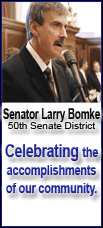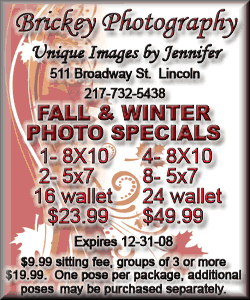 The 35 illustrations each measure 16 by 23 inches and were all drawn
and hand-lettered by the artist. There is also an additional piece
of art and a chronology of events leading up to the ratification of
the 13th Amendment, which abolished slavery. The 35 illustrations each measure 16 by 23 inches and were all drawn
and hand-lettered by the artist. There is also an additional piece
of art and a chronology of events leading up to the ratification of
the 13th Amendment, which abolished slavery."When Abraham Lincoln
said ‘this nation shall have a new birth of freedom,' it meant to me
that freedom needs to be born anew in each generation, and each
generation has to earn it. My artwork reflects this feeling," said
Fink.
The exhibit was opened Wednesday with the participation of five
students who had won a Gettysburg Address essay contest in Ashikaga,
Japan. The five, who read portions of their winning essays at the
presidential library, were chosen from 100 entrants by panels of
judges from Japan and Springfield, the sister city of Ashikaga.
These winners received an all-expenses-paid trip to the
Springfield-area Lincoln sites and recited the Gettysburg Address in
the Old State Capitol State Historic Site, where Lincoln delivered
his famous "House Divided" speech. The essay contest is an endorsed
project of the Illinois Abraham Lincoln Bicentennial Commission.

"The Illinois Abraham Lincoln Bicentennial Commission is honored
to welcome and endorse the Ashikaga, Japan, Gettysburg Address essay
contest winners," said Marilyn Kushak, commission chairwoman. "Their
understanding, perspective and interpretation of this famous
speech's relevance serves as an international inspiration for all."
Fink's original illustrations were created for his book, "The
Gettysburg Address," published in 2007 by Welcome Books. The book
includes an introduction by world-renowned Lincoln scholar Gabor
Boritt, author of "The Gettysburg Gospel." Both books may be
purchased in the Abraham Lincoln Presidential Museum gift shop.
Also on Wednesday, officials in Chicago announced that
schoolchildren from across the country are being invited to
simultaneously read the Gettysburg Address at 9:30 a.m. Feb. 12,
2009, as part of the celebration of Lincoln's 200th birthday. The
effort will originate from the Abraham Lincoln Presidential Museum
and is being coordinated by the museum, the Illinois Abraham Lincoln
Bicentennial Commission and the Illinois State Board of Education.
The Feb. 12 Gettysburg Address reading, called the Four Score and
Seven Project, is generously supported by JPMorgan Chase and The
Chicago Community Trust.
Educational materials concerning Lincoln Bicentennial activities
are now available to teachers at
http://alplm.org//education/
celebrate_bicentennial.html. In addition, Illinois teachers will
now have access to a special curriculum that focuses exclusively on
Abraham Lincoln. The Bicentennial Resource Guide covers lessons
about the 16th president's life, from his early days in Kentucky and
Indiana, to his time in Illinois, his presidency and assassination.
The Illinois State Board of Education is making this special Lincoln
curriculum available to teachers in conjunction with the Indiana
Department of Education. The lessons, developed by the Indiana
Department of Education, align to the Illinois Learning Standards,
and teachers can download the material at no charge from
http://www.isbe.net/htmls/abe.htm.

Citizens of all ages are also encouraged to submit entries for
the global online essay contest "Looking for Your Lincoln Hero." The
new submission deadline is March 1, 2009, and four winners will
receive a trip during the summer of 2009 to see Lincoln legacy
sites, including the Abraham Lincoln Presidential Library and
Museum. Visit
http://www.myhero.com/ for more information.
Historical background
For three days, July 1-3, 1863, Union forces commanded by Gen.
George Meade and Confederate forces led by the military genius
Robert E. Lee battled for victory in the sleepy Pennsylvania village
of Gettysburg. Lee had made a daring attempt to take the war into
the North with the hope of demoralizing a war-weary Northern public.
But his overwhelming defeat at Gettysburg marked an end to any
serious Confederate invasion of the North. And Meade's failure to
pursue Lee prevented the knockout blow that Lincoln and the North
hoped would end the bloody war.
The carnage left in the wake of battle staggered even the most
battle-hardened veteran. Lee lost more than 23,000 of his 75,000 men
at Gettysburg, with Meade losing 23,000 of 85,000 Union soldiers.
The shallow graves hurriedly dug to bury the dead were inadequate as
rain and animals quickly uncovered the bodies.
[to top of second column] |

David Wills, a local attorney, suggested that 17 acres be purchased
as a proper burial place for all of the dead. States were asked to
send delegations to the dedication scheduled for Oct. 23, 1863.
Edward Everett, the foremost orator in the country, was contacted on
Sept. 23, inquiring if he would deliver the dedication oration.
Everett responded favorably but suggested that the occasion be
delayed until Nov. 19 to allow him adequate time to prepare his
remarks. As an afterthought, Wills sent an invitation to President
Abraham Lincoln on Nov. 2 to offer "a few appropriate remarks."
Popular mythology has Abraham Lincoln penning his speech on the
train to Gettysburg. In fact, he began working on his speech
immediately. The president composed two drafts in advance of its
delivery, and when staying at the home of David Wills the evening of
Nov. 18, he asked for paper to rewrite portions of his remarks.
Following the speech, Lincoln wrote two copies to be published in
books, including a bound volume featuring Everett's and Lincoln's
speeches that was sold in 1864 to raise money for the war effort.
This volume was purchased in 1944 by the state of Illinois, and it
is the source of the Gettysburg Address owned by the Abraham Lincoln
Presidential Library and Museum.
"Lincoln's brief speech reminds Americans that the ideals of
equality and freedom are foundational to healthy democratic
government. A moving testament to the honored dead, the address also
is a challenge to contemplate what was the ultimate cause for their
sacrifice," said Schwartz. "Lincoln urges Americans to expand their
understanding of American equality through a ‘new birth of freedom'
for the former enslaved peoples. The Gettysburg Address remains a
speech for the ages."
For more information on exhibits and programs at the Abraham
Lincoln Presidential Library and Museum, visit
http://www.presidentlincoln.org/. To learn what is planned to
commemorate Lincoln's 200th birthday in February 2009, visit
http://www.lincoln200.net/.

The text of the Nov. 19, 1863, Gettysburg Address follows:
Four score and
seven years ago our fathers brought forth, upon this continent, a
new nation, conceived in Liberty, and dedicated to the proposition
that all men are created equal.
Now we are engaged
in a great civil war, testing whether that nation, or any nation so
conceived, and so dedicated, can long endure. We are met on a great
battle-field of that war. We have come to dedicate a portion of that
field, as a final resting-place for those who here gave their lives,
that that nation might live. It is altogether fitting and proper
that we should do this.
But, in a larger
sense, we can not dedicate, we can not consecrate—we can not
hallow—this ground. The brave men, living and dead, who struggled
here, have consecrated it far above our poor power to add or
detract. The world will little note, nor long remember what we say
here, but it can never forget what they did here.
It is for us, the
living, rather, to be dedicated here to the unfinished work which
they who fought here, have, thus far, so nobly advanced. It is
rather for us to be here dedicated to the great task remaining
before us—that from these honored dead we take increased devotion to
that cause for which they here gave the last full measure of
devotion—that we here highly resolve that these dead shall not have
died in vain—that this nation, under God, shall have a new birth of
freedom—and that government of the people, by the people, for the
people, shall not perish from the earth.
[Text from
Abraham Lincoln Presidential Library and Museum
file received from
the
Illinois Office of
Communication and Information]
 |